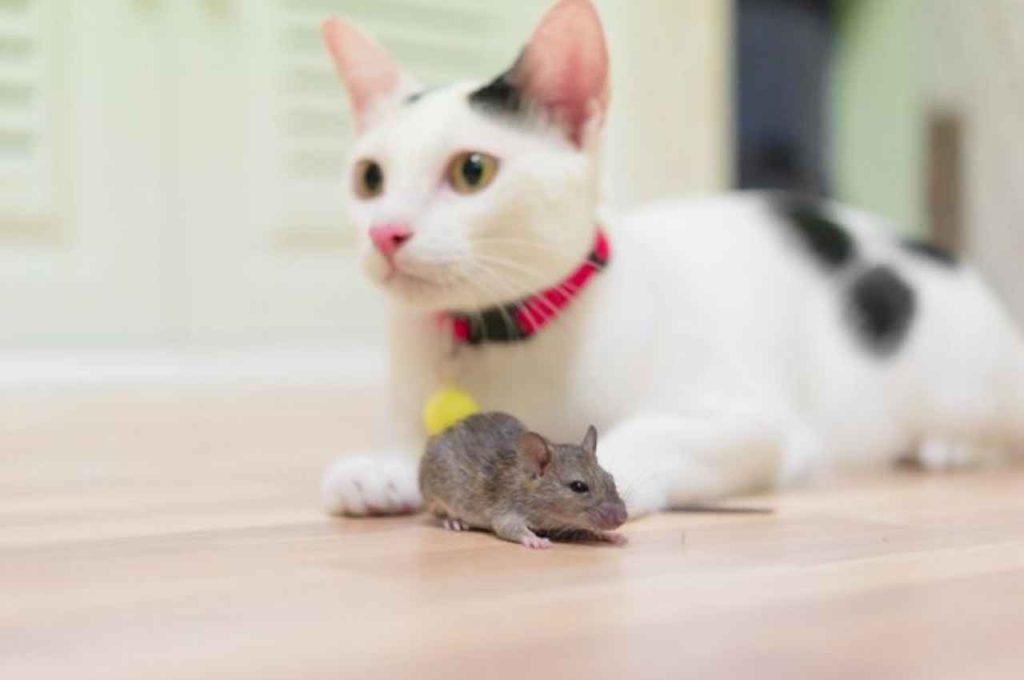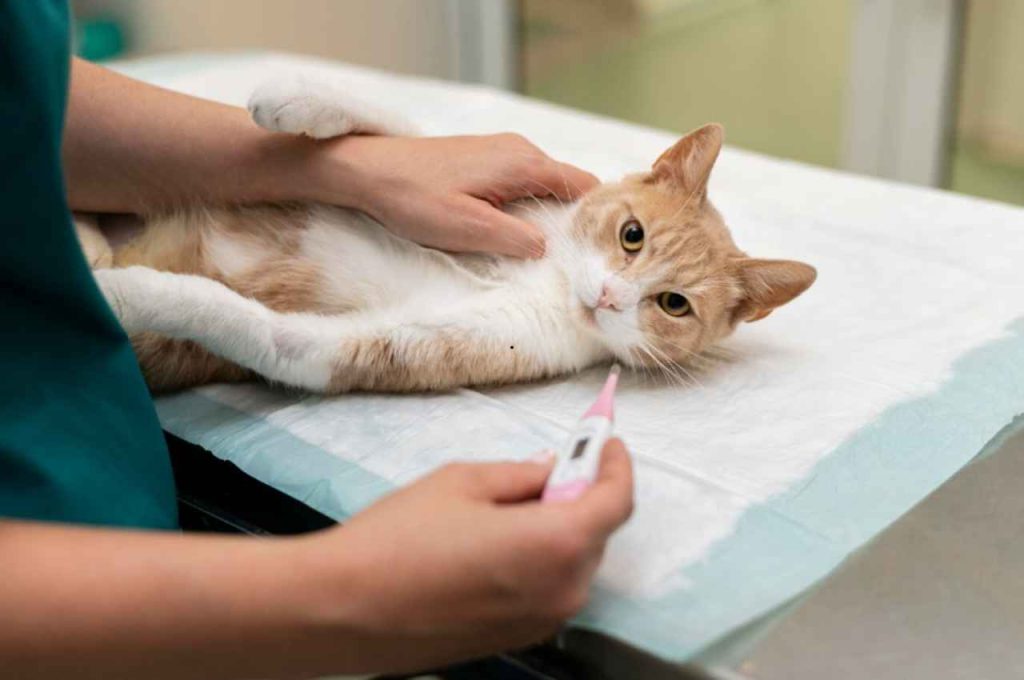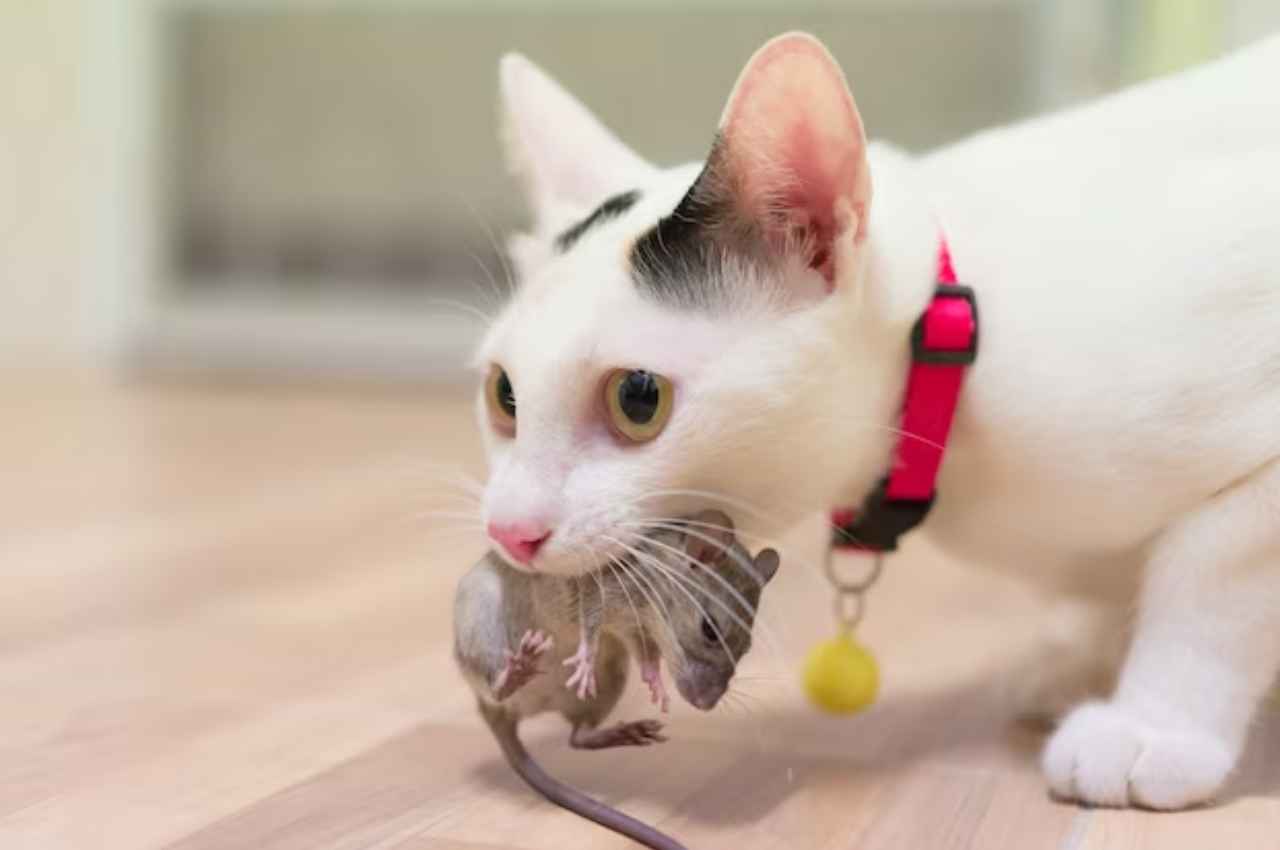Yes, a cat can get sick from eating a mouse due to potential parasites and bacteria. Cats that consume mice may be at risk of contracting diseases such as toxoplasmosis and tularemia.
These illnesses can result in symptoms like fever, lethargy, and digestive issues. Additionally, cats may be exposed to harmful chemicals if the mouse has ingested poison. It’s essential to monitor your cat’s health and seek veterinary care if you suspect they have consumed a mouse. In this blog, we will explore the potential health risks for cats that eat mice and provide tips for preventing such incidents. Understanding the dangers associated with this behavior can help ensure the well-being of your feline companion.
The Reality of Feline Predatory Behavior
Feline predatory behavior is a natural instinct, and cats often hunt mice for food. While it may not be harmful to cats, there is a risk of them getting sick from eating infected mice. It is important to monitor their behavior and keep them up to date on their vaccinations to prevent any potential illnesses.

Why Cats Hunt Mice
Cats hunt mice due to their natural predatory instincts. They are wired to chase and catch small prey to fulfill their hunting needs.
Natural Instincts Vs. Domestication
Cats’ hunting behavior is a result of their natural instincts, even when they are domesticated. Domestic cats retain their hunting skills from their wild ancestors. The reality of feline predatory behavior is essential to understand when considering whether a cat can get sick from eating a mouse. Cats have a natural instinct to hunt and capture prey like mice. This behavior is not just about food; it satisfies their primal hunting instincts.
Domestic cats may not need to hunt for survival, but the urge to stalk and catch prey remains strong. As pets, cats may still hunt mice out of instinct. When a cat catches a mouse, it may consume it. However, eating mice can pose health risks to cats due to potential parasites or diseases carried by the prey. It’s crucial for cat owners to be aware of their feline companion’s predatory behavior and the risks associated with consuming wild prey like mice.
Risks Associated With Cats Eating Mice
When it comes to the risks associated with cats eating mice, it’s essential to be aware of the potential health implications for your feline friend. From parasites and diseases to physical harm and injuries, there are several factors to consider when assessing the impact of this behavior on your cat’s well-being.
Parasites and Diseases
Cats that consume mice are at risk of contracting parasites and diseases that can have adverse effects on their health. Mice can carry parasites such as tapeworms and roundworms, which can be transmitted to cats through ingestion. Additionally, mice may harbor bacteria and viruses that can lead to infections in cats, posing a significant health risk.
Physical Harm and Injuries
In addition to the health risks, cats that prey on mice are susceptible to physical harm and injuries. The act of hunting and capturing mice can result in wounds, scratches, and bites for the cat, potentially leading to infections or other complications. Furthermore, mice may struggle and fight back, causing injuries to the cat in the process.
Common Diseases Transmitted By Mice to Cats
When a cat hunts and eats a mouse, it can be exposed to various diseases carried by the prey. Here are some common diseases transmitted by mice to cats:
Toxoplasmosis
- Cats can get Toxoplasmosis from eating infected mice.
- It is caused by the Toxoplasma gondii parasite.
- Symptoms include fever, lethargy, and loss of appetite.
Intestinal Worms
- Intestinal worms are a common issue transmitted by mice to cats.
- Types include roundworms, tapeworms, and hookworms.
- These worms can lead to digestive problems in cats.
Bacterial Infections
- Bacterial infections can be passed from mice to cats through consumption.
- Common bacteria include Salmonella and Leptospira.
- Symptoms may include vomiting, diarrhea, and dehydration.
Symptoms to Watch Out for
When it comes to cats, it’s not uncommon for them to hunt and eat mice. However, it’s important for cat owners to be aware of the potential risks associated with this behavior. While cats are natural predators, consuming mice can sometimes lead to sickness. If you suspect that your cat has eaten a mouse, it’s essential to keep an eye out for any symptoms that may indicate illness.

Behavioral Changes
Cats are known for their independent and sometimes mysterious nature. However, if your cat has recently consumed a mouse, there are certain behavioral changes you should be on the lookout for. These changes can indicate that your cat is not feeling well due to the consumption of the mouse. Some of the behavioral changes to watch out for include:
- Decreased appetite or refusal to eat
- Excessive lethargy or low energy levels
- Changes in grooming habits, such as neglecting their coat
- Increased aggression or irritability
- Isolation or withdrawal from social interactions
Physical Signs of Illness
In addition to changes in behavior, there are also physical signs that may indicate that your cat is sick after consuming a mouse. These signs can vary depending on the individual cat and their overall health. It’s important to keep an eye out for the following physical symptoms:
- Vomiting or regurgitation
- Diarrhea or changes in stool consistency
- Abdominal pain or discomfort, noticeable through restlessness or vocalization
- Weight loss or loss of muscle mass
- Jaundice, indicated by yellowing of the eyes, gums, or skin
- Difficulty breathing or coughing
If you notice any of these symptoms in your cat after they have consumed a mouse, it is essential to consult with a veterinarian as soon as possible. Prompt medical attention can help identify any underlying issues and provide appropriate treatment to ensure your cat’s well-being.
Preventive Measures for Cat Owners
As a responsible cat owner, it is crucial to take preventive measures to ensure the health and well-being of your feline companion. One concern that cat owners may have is whether their cats can get sick from eating a mouse. While it is natural for cats to hunt and capture small prey like mice, there are certain steps you can take to minimize the risk of your cat falling ill.
Safe Outdoor Practices
Allowing your cat to roam outdoors can expose them to various potential health hazards, including consuming rodents. To reduce the chances of your cat getting sick from eating a mouse, consider the following safe outdoor practices:
- Keep your cat’s outdoor area clean and free from potential sources of contamination.
- Regularly check the area for any signs of rodent activity and take steps to deter mice from entering.
- Supervise your cats when they are outside to prevent them from hunting and consuming rodents.
- Consider using deterrents, such as motion-activated sprinklers or ultrasonic devices, to discourage mice from entering your property.
Regular Veterinary Check-ups
To ensure the overall health of your cat, it is essential to schedule regular veterinary check-ups. These check-ups can help identify any potential health issues and provide preventive measures to keep your cat safe. When it comes to preventing sickness from consuming mice, your veterinarian may recommend the following:
- Ensuring your cat is up to date on their vaccinations, including those for common diseases transmitted by rodents.
- Regularly deworming your cat to prevent any internal parasites that may be acquired through consuming mice.
- Discuss with your vet the best diet for your cat to ensure they receive all the necessary nutrients, reducing their instinct to hunt for prey.
- Monitor your cat’s behavior and appetite closely and seek veterinary advice if you suspect they may have consumed a mouse or are showing signs of illness.
By following these preventive measures and taking the necessary precautions, you can help protect your cat from potential illnesses associated with consuming mice. Remember, the health and well-being of your feline companion should always be a top priority.
Treatment Options for Affected Cats
Cats can get sick from eating mice, as mice may carry parasites or diseases. If your cat has consumed a mouse, it is important to monitor their health and watch for any signs of illness. Treatment options may include deworming medication or antibiotics, depending on the specific condition.
Treatment Options for Affected Cats If you suspect that your cat has eaten a mouse and has fallen ill, it’s important to take them to the vet right away. Depending on the severity of the illness, there are different treatment options available for affected cats.
Medications
The vet may prescribe medications such as antibiotics or anti-inflammatory drugs to help your cat recover from the illness. These medications may come in the form of pills or injections, and it’s important to follow the vet’s instructions on dosage and administration carefully.
Dietary Adjustments
In addition to medication, the vet may recommend dietary adjustments to help your cat recover. This may include feeding them a bland diet of boiled chicken and rice or switching to a special prescription diet designed to support their recovery.
Home Care Tips
To help your cat recover from their illness, there are several home care tips you can follow. These include:
- Providing your cat with plenty of fresh water to stay hydrated.
- Keeping their litter box clean to prevent the spread of any potential infections.
- Keeping them warm and comfortable while they recover.
- Observing their behavior closely and reporting any changes to the vet.
It’s important to note that prevention is always the best course of action when it comes to your cat’s health. Keeping your cat indoors and providing them with a healthy, balanced diet can go a long way in preventing them from getting sick in the first place.
In conclusion, if you suspect that your cat has eaten a mouse and has fallen ill, it’s important to take them to the vet right away. With the right treatment and care, your cat can make a full recovery and get back to their happy, healthy self.
The Debate: Indoor Vs. Outdoor Cats
Pros and Cons
When considering whether to allow your cat outdoors, it’s important to weigh the pros and cons.
- Pros: Outdoor access can provide mental and physical stimulation for cats, allowing them to indulge in their natural hunting instincts.
- Cons: On the other hand, outdoor cats are exposed to various risks, including potential illnesses from hunting and interacting with other wildlife.
Impact on Hunting Behavior
Allowing a cat to roam outdoors can significantly impact their hunting behavior.
- Increased Hunting: Outdoor cats are more likely to engage in hunting activities, potentially consuming prey such as mice.
- Implications: This behavior can lead to the ingestion of harmful pathogens or parasites from the prey, affecting the cat’s health.
Real-life Stories and Expert Opinions
Case Studies
One real-life story involved a cat named Whiskers who became ill after consuming a mouse. The owner noticed that Whiskers had a decreased appetite and was vomiting frequently. After a visit to the veterinarian, it was determined that Whiskers had ingested a mouse that was carrying harmful bacteria, leading to a serious infection. Whiskers required prompt medical treatment to recover from the illness.

Veterinarian Insights
According to veterinarians, cats can indeed become sick from eating mice. Mice may carry parasites, bacteria, and viruses that can be harmful to cats. Additionally, the act of hunting and consuming a mouse can lead to injuries, such as scratches and bites, which can also result in infections. Veterinarians emphasize the importance of monitoring cats for any signs of illness after they have ingested a mouse and recommend seeking veterinary care if any concerning symptoms arise.
Conclusion
Cats can get sick from eating a mouse. This is because mice can carry diseases such as toxoplasmosis and salmonella. It is important to monitor your cat’s behavior and health if they have eaten a mouse. To prevent this from happening, it is best to keep your cat indoors and provide them with a well-balanced diet. Always consult with your veterinarian if you have any concerns about your cat’s health.
